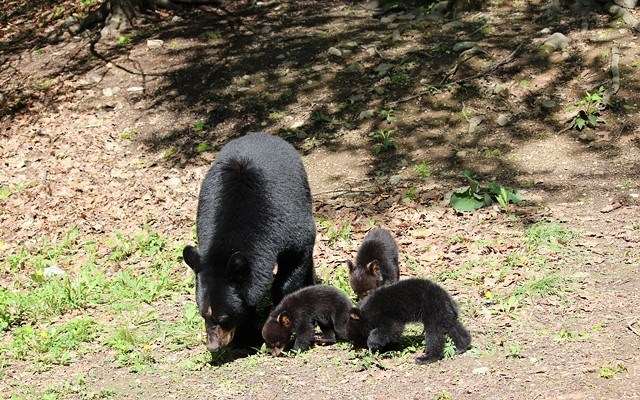The accidental death of a tranquilized bear that fell from a tree in Creekside has rai sed questions about the Conservation Officer Service's (COS) handling of the incident.
Last Monday, Oct. 8, the COS responded to a sow bear and her three cubs that had reportedly been accessing berries from several mountain ash trees in a residential area of Creekside. In an effort to relocate the bears a short distance away, the officer on the scene tranquilized the sow, which subsequently climbed a tall tree and then fell to her death.
"It was an accidental death. The intent was to capture the bear and bring it somewhere else to give us time to deal with the numerous attractants in the area," noted Sgt. Simon Gravel. "I was not there, but the decision was made by the officer to remove that family unit and, unfortunately, the sow, after being drugged, she climbed very far up the tree and that was obviously not the intent. When she fell, she broke her neck and died from the injury."
Gravel went on to explain that typically, conservation officers would attempt to haze the bear from a residential area, but with so many bear attractants nearby, "the effort is useless, because they will just come back to the attractant."
Gravel also noted that, 'We like to capture (bears) in controlled areas, like up a tree, but obviously we don't want them to go up a very big tree and go very far up. That's what happened this weekend.
"We capture a lot of bears using that technique and it's very, very rare that an incident happens."
But Nicole Fitzgerald with the Whistler Get Bear Smart Society questioned whether the bears needed to be relocated in the first place.
"My question is: should not more consideration been given when there are higher stakes, such as a mother and three cubs? There was no report of these bears posing a threat to the public; they were eating what they considered a natural resource, mountain ash. They weren't into any garbage," she said. "In some instances, isn't the best course of action to stand back?"
The local COS is in the process of obtaining a "capture net" that can help absorb a bear's fall, Gravel noted. When asked why the COS hadn't already acquired the net, Gravel said, "There was not much on the market that we liked and could utilize. We've been looking into it for many, many years, and we just, finally, a few months ago, found a product that could be suitable for our officers to use. We have one on the go, it was ordered, and it will be here for the next season."
The sow's three cubs, which are just under a year old, will not be relocated, Gravel said, based on the advice of a veterinarian that the COS has consulted with.
"We had some conversations with our provincial vet, who advised us what to do in these circumstances. She was confident that the best thing for those cubs, due to their location, food source, the time of the year, and their size and health, was to just release them," he explained.
"It's believed their best chance to survive and have a wild bear's life at this point was to be released."
Fitzgerald said researchers are divided over the best course of action when dealing with orphaned cubs, although the society's position is that "the cubs would have had a better chance if they were transferred to (Langley wildlife rehabilitation centre) Critter Care, where they would have been released in the spring.
"Our hope is that the cubs are going to stick together and put on the necessary weight for winter."
A separate bear was relocated from Creekside, also on Monday, after it had repeatedly accessed mountain-ash berries in the area, Gravel confirmed.
"Our next step here is obviously working with the (municipality) and our different partners to ensure that residents understand that having a fruit tree, mountain ash or any vegetation that can attract bears in Whistler is not suitable, and they should be removed and replaced by non-berry-type vegetation," he said.
The sow is the fourth bear that has died in Whistler so far this year: two were killed by the COS as a result of human conflict, and another sow was electrocuted on Aug. 31 after climbing a power pole on Whistler Mountain. Whistler Blackcomb confirmed at the time that the power pole, which is currently unused, is scheduled for removal.




